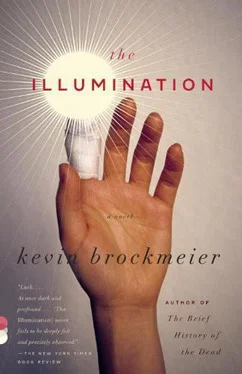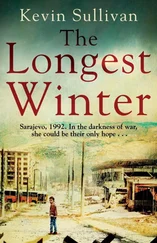The journal lay on the walnut table by Carol Ann’s sofa, and though she had finished nearly a quarter of it, she still had to remind herself that it was not a continuous outpouring of unbroken passion, that every sentence represented a small, isolated profession of love, separated from the ones that came before and after it by the hard line of a night’s sleep. The book was like the row of squares on a calendar: each piece held nothing more than the bare outline of a single day. It seemed to reveal the couple’s marriage as fully as any diary, though, and the further she read, the more intimately she felt she knew them. The husband’s name was Jason, and the wife’s name was Patricia, and their relationship was as open and playfully chiding as it had been on their wedding day. They drove to the lake to picnic and swim, and they rented Woody Allen movies on the weekend, and though she liked spicy food and he did not, they took turns cooking meals for each other on their old gas stove. Carol Ann had seen the light fade from the woman’s body but had failed to learn her name until she reached the journal’s seventeenth page, when she came across the line, I love sticking your name in songs where it doesn’t fit the rhythm: “Patricia Williford, why don’t you come to your senses? ” The fact that the two of them were no longer kissing each other’s shoulders, or taking their rings off when they did the dishes, or dancing but only from the waist up—it seemed like a frightening mistake. And even if there was a Heaven, she thought, and even if they were together in it, that would not make it right.
She was finding it difficult to concentrate at work. In part it was the weather, a sudden string of gentle blue days that had lured thousands of birds into the air, but mostly it was her thumb, which still throbbed with pain, throwing up obstacles around even the easiest tasks. Answering the phone, punching the space bar on the keyboard, opening the window, retouching her makeup, maneuvering a bag of chips through the sliding gate of the vending machine—every hour presented her with another puzzle to solve. She knew she was in trouble the moment she got home from the hospital and found a pile of newspapers scattered on her welcome mat. Right away she realized she could not pitch them up to herself with one hand while she held on to her pocketbook with the other, as she ordinarily did, so she slipped off her shoes and spent an aggravating few minutes trying to kick them inside. The glass door kept swinging shut in the wind, though, and the papers came bounding back at her with a terrible banging noise, and finally she had to give up, put her purse on the accent table, and kneel down to collect them one by one. As soon as her wound finished healing, she knew she would be able to use her left hand again, but until then she would just have to keep bobbling through her days like a steel marble in a tilting maze game.
On Tuesdays and Fridays, she left work early for an appointment with her physical therapist, a briskly competent but slightly abstracted woman who seemed to view human beings as a simple collection of joints, muscles, and nerve bundles. At the beginning of each session, she would greet Carol Ann with a short conversation like—
“How are you doing this afternoon?”
“I’m all tangled up inside.”
“Super! Now let’s focus on that hand of yours.”
—then lead her through a series of exercises designed to improve the strength and dexterity of her thumb, or what was left of it. There was the “thumb press,” which involved flattening a barrel-shaped lump of clay into her palm. The “thumb abduction,” a maneuver resembling a leg lift with her hand filling in for her body. The “isometric thumb extension,” in which she made a hitchhiking gesture while her therapist applied pressure with an index finger. And then there was the “putty pinch” and the “prayer position” and half a dozen others. Her therapist had her repeat each of the exercises in three sets of ten, counting off the repetitions— one, two, three, you’re doing good, five, six —while Carol Ann nodded along and pretended she thought it was helping. The glow that had been concentrated in her thumb would gradually spread across her entire hand, following the extensor in a long line up her forearm, and by the time the hour was over, anyone who saw her stealing through the back hallway to the parking lot, balancing her palm before her like a waiter carrying a bowl of soup, would know immediately how much her hand hurt. But then that was true of everyone now. Everyone, everyone, everyone, and all the time. The world had changed in the wake of the Illumination. No one could disguise his pain anymore. You could hardly step out in public without noticing the white blaze of someone’s impacted heel showing through her slingbacks; and over there, hailing a taxi, a woman with shimmering pressure marks where her pants cut into her gut; and behind her, beneath the awning of the flower shop, a man lit all over in a glory of leukemia.
At work, Carol Ann took to scouring the Internet for images of political and business leaders with the angry flush of renal disease, the barbed-wire knot of a blocked artery, or any of the hundreds of other telltale patterns of resplendence she had learned to recognize. She included these pictures in her news packets without comment. And if her hand flared with pain while she was delivering a hard copy to her boss, and if the silver light of a toothache shone from his mouth as he said thank you, the two of them might make a small motion of their heads in sympathy, but they would not say a word. It was important that the workplace remain professional. They all tried their best not to acknowledge one another’s suffering. Even when one of the receptionists came in with belt-strap bruises radiating through the front of her shirt, wincing each time she reached to open the filing cabinet, the rest of the staff avoided saying anything to her. It was almost noon that day before Carol Ann found the woman inspecting her stomach in the bathroom mirror and was forced to ask her if she was all right. She met Carol Ann’s eyes in the glass, shook her head in disbelief, and repeated the question: “Am I all right? Am I all right? Am I all right ?” It was like a chant or a song, four hard beats, and for the rest of the day, as Carol Ann sat hunched over her computer, surveying the leaders of the world, in all their wounds and illnesses, the phrase kept replaying itself in her mind: Was she all right? Was she all right? Was she all right?
Nearly a month had passed since she sliced through the tip of her thumb. One evening she arrived home to discover another package from her ex-husband waiting by the front door. This time the seams were covered by only a few strips of masking tape. Even with her good hand cramped from typing, she was able to steady the box against the kitchen counter and open it. Immediately beneath the lid was the front section of the Financial Times , and beneath that was a magazine called How to Spend It , and beneath that were hundreds of red plastic drinking straws. She knew how his mind worked, knew that wasting her time was a favorite mean little game of his, and right away she guessed what he had done. She still had to sort through forty or fifty straws, though, blowing into each of them with a hard blast of air, before she found the one into which he had rolled her alimony check. It shot out with the quiet phut of a spitball, landing upright between the ribs of the dish drainer. His usual petty degeneracy. She could picture him leaning back in a chair somewhere, grinning triumphantly, bowing his hands out to crack his knuckles. I love the way your face falls whenever you see my handwriting on an envelope. I love how easy it is to aggravate you. I love waking up next to someone else in the morning . For a moment she allowed herself to contemplate leaving an angry voice-mail message for him—she could threaten to file suit against him for her medical expenses, or for malicious wrongdoing—but the truth was she had injured her thumb by her own carelessness, she and no one else, and anyway he had changed his phone number, and she did not know the new one.
Читать дальше












